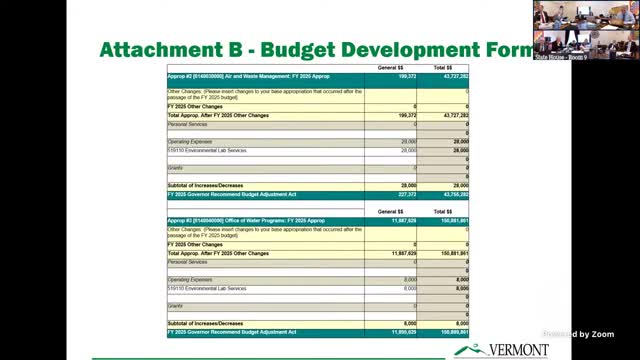ANR says ARPA water projects on track as staffing and vacancies shape delivery
Get AI-powered insights, summaries, and transcripts
Subscribe
Summary
Agency of Natural Resources officials told the House Appropriations Committee that nearly $200 million in ARPA funds are encumbered for water-infrastructure projects and that 60 limited‑service positions were added to deliver them, but hiring and retention—especially for engineers and finance staff—remain a challenge.
The Agency of Natural Resources told the House Appropriations Committee on Jan. 17 that nearly $200 million in American Rescue Plan Act funds are committed to water-infrastructure projects and on‑the‑ground construction is expected to accelerate this summer.
"ANR received just shy of $200,000,000 worth of ARPA funds," Secretary Julie Moore said, detailing investments in replacing failed wells and septic systems, grants to manufactured housing communities, combined‑sewer overflow elimination and stormwater management. Moore said every ARPA dollar the agency received is currently encumbered and that the agency is on track to have projects built by the end of calendar 2026, the statutory obligation attached to those funds.
Moore and CFO Steve Gomez said the agency has added about 60 limited‑service positions to deliver ARPA projects—roughly two‑thirds technical and one‑third financial—and that these hires have been essential to moving projects forward. However, committee members and ANR officials noted continuing hiring challenges in particular program areas.
Moore said vacancy rates vary across the agency and cited engineering and business/finance roles as especially difficult to fill because private‑sector pay sometimes outcompetes state salaries. She recounted that DEC Commissioner Jason Batchelder had reported a roughly 11% vacancy rate in a related agency unit. The agency is pursuing a mix of hiring, temporary contracting, and competitive salary offers to fill critical positions but said persistent turnover can slow project timelines.
Moore said limited‑service hires have sometimes moved into permanent positions—a positive outcome for staffing but one that creates churn in short‑term roles—and that leaders are discussing ways to retain capacity beyond the ARPA timeframe. ANR officials said they are monitoring reporting and audit obligations tied to federal funds as they move from planning into implementation.
Committee members asked about long‑term capacity to finish ARPA projects and whether limited‑term positions would be converted; Moore said conversations are underway at leadership levels but did not commit to specific conversions during the hearing.
